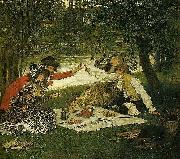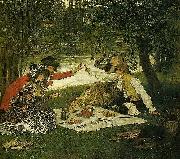
|
James Tissot
|
|||
|
|
|||
| French Painter, 1836-1902 French painter, printmaker and enamellist. He grew up in a port, an experience reflected in his later paintings set on board ship. He moved to Paris c. 1856 and became a pupil of Louis Lamothe and Hippolyte Flandrin. He made his Salon d?but in 1859 and continued to exhibit there successfully until he went to London in 1871. His early paintings exemplify Romantic obsessions with the Middle Ages, while works such as the Meeting of Faust and Marguerite (exh. Salon 1861; Paris. Mus. d'Orsay) and Marguerite at the Ramparts (1861; untraced, see Wentworth, 1984, pl. 8) show the influence of the Belgian painter Baron Henri Leys. In the mid-1860s Tissot abandoned these tendencies in favour of contemporary subjects, sometimes with a humorous intent, as in Two Sisters (exh. Salon 1864; Paris, Louvre) and Beating the Retreat in the Tuileries Gardens (exh. Salon 1868; priv. col., see Wentworth, 1984, pl. 45). The painting Young Ladies Looking at Japanese Objects (exh. Salon 1869; priv. col., see Wentworth, 1984, pl. 59) testifies to his interest in things Oriental, and Picnic (exh. Salon 1869; priv. col., see 1984 exh. cat., fig. 27), in which he delved into the period of the Directoire, is perhaps influenced by the Goncourt brothers. Tissot re-created the atmosphere of the 1790s by dressing his characters in historical costume. | |||
|
|
|||
|
Partie Carree new25/James Tissot-744734.jpg Painting ID:: 85446 |
oil on canvas first exhibited in Paris in 1870 cjr | ||
|
|
|||
|
James Joseph Jacques Tissot
|
|||
|
|
|||
| James Jacques Joseph Tissot (15 October 1836 - 8 August 1902) was a French painter, who spent much of his career in Britain. Tissot was born in Nantes, France. In about 1856, he began study at the École des Beaux-Arts in Paris under Hippolyte Flandrin and Lamothe, and became friendly with Edgar Degas and James Abbott McNeill Whistler. Tissot exhibited in the Paris Salon for the first time in 1859, two portraits of women and three scenes in medieval dress from Faust. The latter show the influence of the Belgian painter Henri Leys (Jan August Hendrik Leys), whom he had met in Antwerp in 1859. In the mid-1860s, however, Tissot began to concentrate on depicting women, often although not always shown in modern dress. Like contemporaries such as Alfred Stevens and Claude Monet, Tissot also explored japonisme, including Japanese objects and costumes in his pictures. A portrait of Tissot by Degas from these years (Metropolitan Museum of Art, New York) shows him with a Japanese screen hanging on the wall. | |||
|
|
|||
|
Partie Carree new25/James Joseph Jacques Tissot-449898.jpg Painting ID:: 89578 |
oil on canvas first exhibited in Paris in 1870 Date 1870(1870) cyf | ||
|
|
|||
|
Also Buy::. For Following Paintings / Artists / Products, Please Use Our Search Online: |









